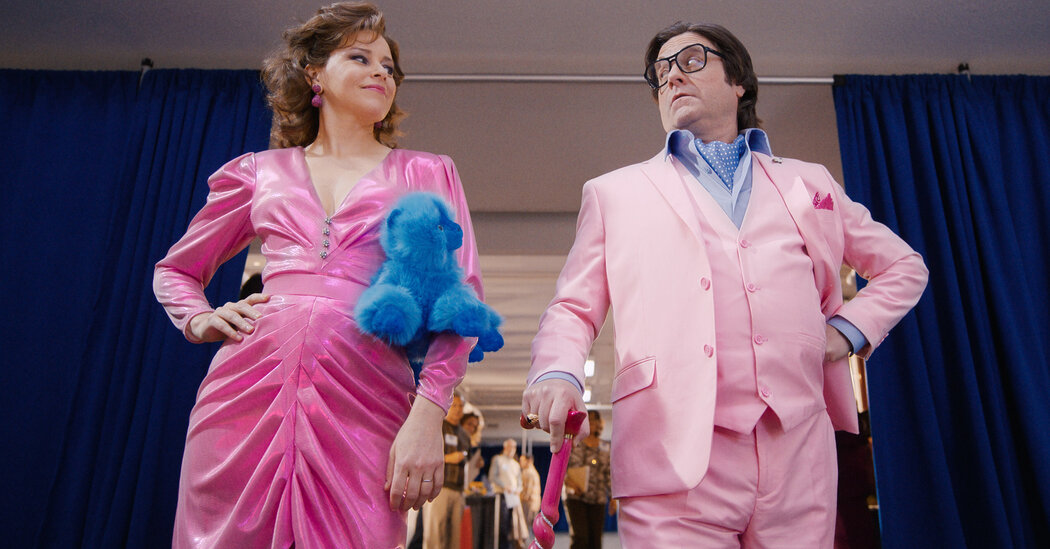
John Updike once described writing as a matter of “taking a deep breath, leaning out over the typewriter and trying to drive a little deeper than the first words that come to mind.” Unfortunately, the writing in “The Beanie Bubble,” a dramatic comedy based loosely on the true story of the short-lived Beanie Baby toy craze, sits on the surface.
This is a movie that uses stock footage of the Bill Clinton inauguration and the O.J. Simpson trial to demonstrate that it’s the 1990s, and which, to show a flashback to the ’80s, has a character ask, “Did you pick up any Tab?” It deploys every storytelling cliché in the book, from “you’re probably wondering how I ended up in this situation”-style voice-overs to pat last-act monologues that reiterate the themes.
The story of Beanie Babies is not especially interesting: In 1993, Ty Warner (Zach Galifianakis), the creator of Beanie Babies, introduced the plush animal dolls for $5, and then, owing to a confluence of opportune internet savvy and a nascent secondary market on the web, they became coveted for their scarcity.
“The Beanie Bubble” contrives to add intrigue by embellishing various personal dramas behind the scenes at the company, including infidelities, a fraught love triangle and the ethical quandaries of three women who worked with Warner and in some cases were involved with him romantically: Robbie (Elizabeth Banks), Sheila (Sarah Snook) and Maya (Geraldine Viswanathan).
Each of these women has exactly one defining feature — she is eager to get rich; or she loves her children; or she knows a lot about computers — and the women mention this feature every single time they’re onscreen. The directors, Kristin Gore and Damian Kulash, Jr., make several embarrassing efforts to cast them as feminist superheroes at odds with the cluelessly patriarchal Warner, which might have been more effective had they been fleshed out as anything more than paper-thin Girl Boss caricatures. As it stands, the celebratory montages that herald these women’s professional triumphs are about as rousing as a Sheryl Sandberg TED Talk.
Much of the film’s running time is dedicated to graphics detailing Beanie Baby sales figures, archival news footage showing mall shoppers going crazy and oversimplified explanations of Beanie-related milestones and achievements, such as how the company became an early pioneer of e-commerce.
These elements are, of course, reminiscent of “Air,” “Tetris,” “Flamin’ Hot” and “Blackberry,” among other recent making-of marketing pictures. It’s not the fault of “The Beanie Bubble” that it arrives at the tail end of a summer of similar corporate biopics, but seen after so many other marketing making-of dramas, the familiar beats of novel invention to overnight phenomenon can’t help but feel all the more hackneyed.
Like those films, “The Beanie Bubble” attempts to extrapolate some more substantive social meaning from what is otherwise an amusing but ultimately insignificant moment in time. The best it can do is to conclude, feebly, that there will “always be another fad,” with references to cryptocurrency and NFTs. This conclusion is hard to square with the movie’s earlier claim that the Beanie Baby craze ushered in “a new era of capitalism,” but that paradox is typical of its shaky approach. In any given moment, the movie is either overstating the importance of its subject or trivializing it.
Can we learn anything from this? “The Beanie Bubble” proves that there will always be movie fads, but some of them will be worse than others.
The Beanie Bubble
Rated R for strong language and some mild sexual content. Running time: 1 hour 50 minutes. Watch on Apple TV+.













